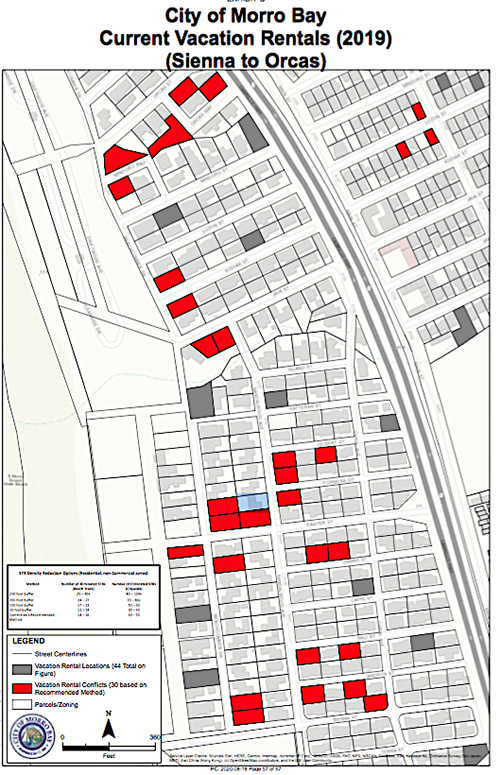Morro Bay City map from 2019 shows the locations of over 40 vacation rentals on both sides of Hwy 1 just
from Sienna Street to Orcas Street.
As its permanent-ordinance wends its way through the bureaucracy, the Morro Bay City Council voted to put an emergency moratorium on any new vacation rental licenses.
Entitled, “An Interim Urgency Ordinance of the City Council of the City of Morro Bay, California, Approving a Citywide 45-Day Moratorium on the Issuance of Any New Permit, License, Approval, or Entitlement Pertaining to a Short-Term Vacation Rental Within the City of Morro Bay and Declaring the Urgency Thereof,” the moratorium is on short-term rentals or vacation rentals in residential zones.
It does not apply to those in commercial or visitor serving zones. Nor does it apply to “home-sharing” operations (like those through AirB&B), where someone rents out a bedroom in their home for a short-term stay, while they too are at home.
“The City has approximately 250 permitted short-term vacation rentals,” reads the staff report by City Attorney Chris Neumeyer. “While travel and vacationing has decreased compared to previous years, short-term vacation rentals are still in use. Additionally, in the last couple of years, social media has increased exponentially the popularity and demand for short-term vacation rentals.”
But it’s that popularity that has some residents alarmed at the number of VRs that have seemingly sprung up overnight, across the City and in every neighborhood except the Cloisters where the CC&Rs prohibit them.
The City Council woke to the issue in May 2016 when it directed staff to “revise the City’s vacation rental policies,” Neumeyer said, “to better address quality of life issues in residential neighborhoods and to include the revision in the City’s ongoing General Plan/Local Coastal Program/Zoning Code update process.”
The Council also settled on 250 as the cap on the number of licenses.
That June they implemented the first moratorium of VRs setting the 250 cap. In July 2016, they re-upped the moratorium for another 22 months and 15 days, expiring in 2018.
In May 2018, the Council permanently adopted the 250 cap (Ordinance 613, MBMC Section 5.47.050) for VRs in residential zones.
Since then, the City formed a committee of business people and residents to hammer out a comprehensive VR ordinance. The results of that effort went before the Planning Commission this month, with a final vote for approval at the Sept. 1 meeting.
Among their recommendations is to cut the cap down to 175 in residential zones and not limit at all home-share arrangements, or VRs in commercial and visitor-serving zones.
Any drop was strongly opposed by people connected with the vacation rental industry in correspondence sent to the commission.
“If vacation rentals are already licensed and functioning, it does not seem fair to take away a license just because the new ordinance now makes them too close to another VR,” wrote Beth Appel, who said her family rents out their home when they leave on vacation, adding that it’s worked very well for them.
Another commenter, Bob Lalor of Oxnard, said his family likes to spend New Year’s in Morro Bay. “My family has built a wonderful tradition of spending New Year’s in Morro Bay for 5 years straight in the same rental. We treat it as a peaceful getaway, filled with walks, beach time, golf, cooking, and more walks. It would be a shame to lose such a thing based off of the voices of a few disgruntled homeowners. Instead of looking at a ban, why not focus on how you can make the system work FOR you.”
Mark and Carol Hays of Visalia wrote, “We sunk our entire life savings into this house almost five years ago and intend to retire there within five years. The only way we can do that is to rent it out as a vacation rental (as per our original plan) until we move in. We see Morro Bay as our hometown the same as anyone who lives there and we want to preserve its character for ourselves too. We care about the quality of life for all residents. It is an affront to us to be characterized as anything other than members of that community [especially since we are there a large portion of the time].”
The Hays’ urged the City to pick up its enforcement efforts and crack down on unlicensed VRs. “Many of the complaints of full time residents could be alleviated through the act of enforcing the policies already in place. In our case, we are the only licensed rental for at least a city block in any direction. However, there are some within that circumference that operate as STRs and are NOT licensed [we confirmed this through our knowledge of our neighborhood and the obtaining of a list of all current licenses in the City]. It is a waste of time and money to put a new ordinance in place when the existing ordinances are not being enforced and, frankly, an insult to those of us living by the rules.”
The Hays’ supported reducing the 250 cap to 200 and that the licenses stay with the property should it be sold.
Cynthia Mauch wrote that she and her brother own their parent’s old house and rent it out to vacationers. It’s allowed them to keep the home in the family, use it when they want and represents cherished memories of growing up here.
“I understand that some proponents of the ordinances feel that VRs are a scourge to Morro Bay,” Mauch wrote, “bringing rude partiers who don’t care about neighbors or about our town, and are loud all night and scatter trash and park illegally. I can firmly tell you that is not the case with my rental. We have had no such complaints, we house primarily families looking to spend some quiet time together in our beautiful seaside community. Moreover, I have had no issues in my own neighborhood [North MB] in terms of neighboring vacation rentals, noise, parking, etc.
“I suspect most of the VRs that cause problems are not permitted, but that no longer seems to be a focal point with this issue – the direction has moved to a fight to eradicate all VRs, even the good, legal ones.”
The City Council is expected to hear the vacation rental ordinance as recommended by the Planning Commission at its Tuesday, Sept. 22 meeting.
Once the Council finishes with it, it will be sent to the Coastal Commission, which has been reviewing such ordinances up and down the California Coast for the past several years. One constant for the Commission has been to prohibit the banning of VRs in any community, considering them to be an affordable way for families to enjoy the Coast by sharing expenses.
For cash-strapped Morro Bay, vacation rentals have been lucrative. According to information from the City Tourism Bureau, in Fiscal Year 2018-19, receipts for VRs totaled $5.5 million and collected $552,000 in bed taxes.
As a comparison, RV parks had $2.5M in receipts and collected $256,000 in bed taxes. The City’s TOT that year totaled more than $3.5M with motels collecting over $2.7M (on $27.6M in receipts).




